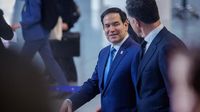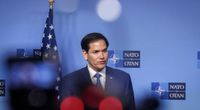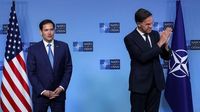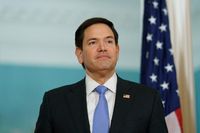In a strong reaffirmation of the United States' commitment to NATO, Senator Marco Rubio declared during a recent meeting of foreign ministers at NATO headquarters in Brussels that the U.S. will remain a steadfast member of the alliance. This statement comes amidst what Rubio described as "hysteria and exaggeration" in global media regarding the U.S. position on NATO.
Rubio, who represented the U.S. alongside Matt Whitaker, the new envoy to NATO, emphasized that under President Donald Trump, the United States is as active in NATO as it has ever been. He stated, "President Trump has clearly indicated that he supports NATO. We will remain in NATO," reinforcing the administration's position on the alliance.
During the meeting, Rubio articulated a vision for a stronger NATO, calling on member states to increase their defense spending to at least 5 percent of their Gross Domestic Product (GDP). He noted that strengthening NATO is crucial for maintaining peace and security in light of existing global threats, particularly from nations like Russia, China, Iran, and North Korea.
Matt Whitaker echoed Rubio's sentiments, asserting that under Trump's leadership, NATO will be stronger and more effective than ever. He remarked, "I believe that a strong NATO can continue to serve as the foundation for peace and prosperity," highlighting the importance of each ally contributing fairly to the alliance's collective defense.
The discussions at the NATO meeting were further supported by remarks from NATO Secretary General Jens Stoltenberg, who reassured attendees that there are no plans for a sudden withdrawal of U.S. forces from NATO. Dutch Prime Minister Mark Rutte also affirmed the commitment of the U.S. to NATO, stating, "We know that Americans expect Europeans and Canadians to spend more. And that is happening." He noted that there is a significant increase in defense spending among NATO countries, the largest since the fall of the Berlin Wall.
As the meeting progressed, the focus remained on the need for increased military readiness and funding among NATO allies. The urgency of this call to action stems from the perceived threats posed by Russia's aggressive posturing and the potential for instability in other regions.
In light of these discussions, Rubio's statements reflect a broader strategy by the Trump administration to bolster NATO's effectiveness while simultaneously pressuring member states to meet their defense spending commitments. This approach aims to ensure that NATO remains a formidable force in global security.
Rubio's emphasis on collective defense spending is not merely a rhetorical flourish but a critical component of NATO's operational effectiveness. The call for increased military budgets resonates with concerns that many member states have not met their obligations under the alliance's agreements, which stipulate that defense spending should reach at least 2 percent of GDP.
However, the new push for a 5 percent target raises questions about feasibility and the political climate within member states. Many European nations are grappling with their own economic challenges, making such increases a contentious issue.
Moreover, the backdrop of U.S.-Russia relations complicates the dynamics within NATO. As tensions have escalated over various geopolitical issues, the need for a united front among allies has never been more pressing. Rubio's remarks serve as a reminder of the delicate balance that NATO must maintain in addressing both internal and external pressures.
The meeting in Brussels was not just a routine gathering but a crucial moment for NATO as it seeks to navigate a rapidly changing global landscape. With the rise of new threats and the shifting geopolitical order, the alliance's unity and strength are paramount.
As NATO continues to adapt to these challenges, the dialogue initiated by Rubio and Whitaker underscores the importance of U.S. leadership in the alliance. Their commitment to NATO's future is indicative of a broader strategy to reinforce the transatlantic partnership and ensure that the alliance remains relevant in an increasingly complex world.
In conclusion, the reaffirmation of the U.S. commitment to NATO by key figures like Marco Rubio and Matt Whitaker reflects a concerted effort to strengthen the alliance amidst growing global uncertainties. With calls for increased defense spending and a united approach to external threats, NATO stands at a pivotal moment in its history, one that will shape its role in global security for years to come.








